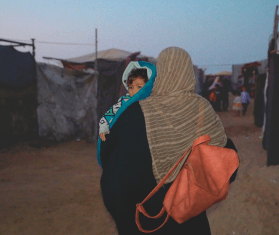January 2024 marks my one-year anniversary with MSF. My role is to support women at every stage of their pregnancy, from before delivery to postpartum care. This includes assisting those facing potential obstetric or gynecological complications and, most importantly, being there during childbirth.
At the maternity unit in this camp, I work alongside seven other midwives and seven midwife assistants. We have eight postpartum beds, six observation beds, and three delivery beds.
On average, we witness approximately 30 births per week—around four to five babies born per day—but there are days when we attend seven or eight deliveries. I’ve never really counted, but there are always so many babies born here. In 2024 alone, we managed nearly 1,000 births.
Outside the maternity ward, as part of outpatient care, a dedicated team of midwives and their assistants provide prenatal and postnatal consultations to pregnant women. Additionally, a small core team of midwives operates our mobile clinic around the camp. We also support survivors of sexual violence by providing essential medical care and offering psychosocial support based on their needs.

Women supporting women—this is how I see it
The women who come to the maternity unit trust us deeply, confiding their anxieties about the future. Around 80 percent of our patients are Sudanese women who fled the war in 2023 and have been living in the camp ever since. We do everything we can to reassure them and support them in any way possible.

As a woman who has given birth myself, I understand their pain—I know what they’re going through.
It’s not always easy, but I am proud of the work I do. Each time I attend a birth, I feel a profound sense of pride. I love my profession deeply, and I want to continue practicing it every day for the rest of my life.
First baby of 2025 in Aboutengue clinic
Rachida's baby boy was born at 1:20 a.m. on January 2 in MSF’s maternity ward in Aboutengue camp, the first to be born there this year.
"Since the beginning of my pregnancy, I have been attending prenatal consultations with the MSF team in Aboutengue camp. I visited the clinic five times and was given information about the progress of my pregnancy. I was also given cereals and oil to improve my health, as recommended by the midwife during the consultations.
At my last appointment, the midwife told me that I was already nine months pregnant and advised me to go to the maternity ward if I felt any pain. In the late hours of January 1, I began to feel abdominal pain...





